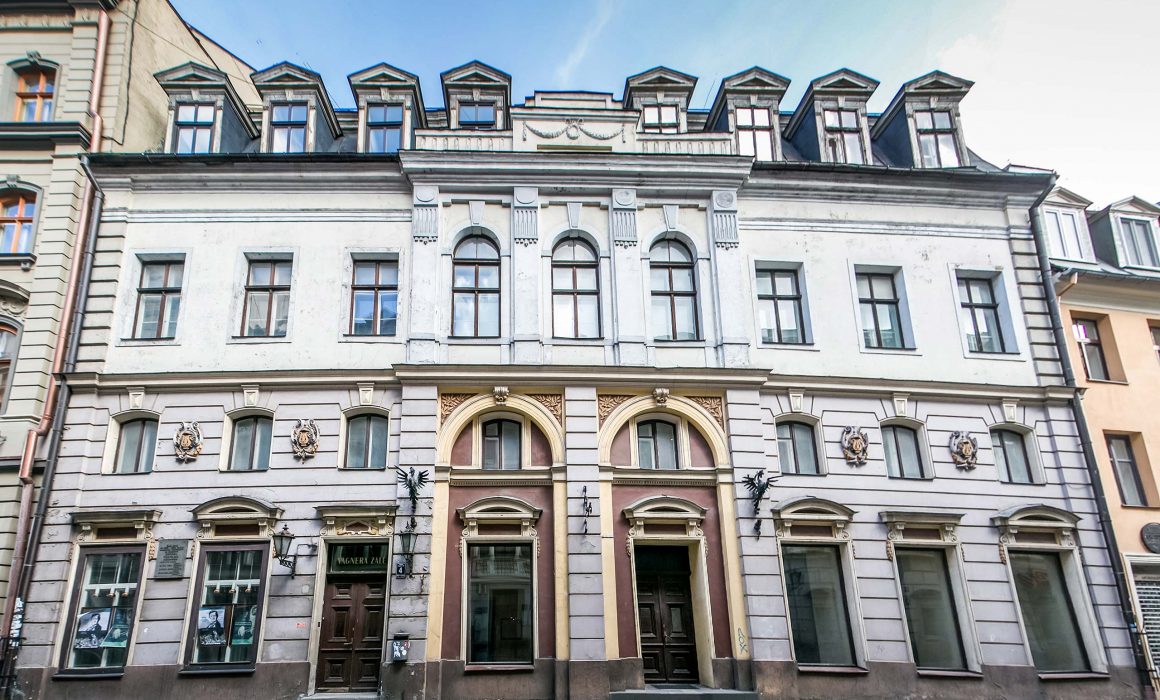Cornerstone Ceremony of the Wagner Theatre in Riga on May 21
On Sunday, 21 May, a time capsule ceremony will be held at the Wagner Theatre, symbolically marking the start of the restoration work of the building.
Since 2017, the Riga Richard Wagner Society (RRVS) has been organising flash events on Wagner’s birthday to draw public attention to the need to renovate the Wagner House. This year, the reconstruction of the theatre will finally start and the Society has decided to celebrate the 210th anniversary of Richard Wagner by burying a time capsule in the facade of the building. It will contain various documents and testimonies of the time, including the founding minutes of the RRVB, historical images of the building and current drawings of the project, messages from the patrons of the project, a message from the members to their descendants, as well as a joint message from three generations of Wagnerians – Eva Wagner-Pasquier, her son Antoine Wagner and her granddaughter Daphne Wagner.
The ceremony will be attended and solemn speeches will be made by Māris Gailis, Chairman of the Board of the RRVB, Egils Levits, Patron of the Wagner House restoration project, and Alexander Graf Lambsdorff, Chairman of the German-Baltic Parliamentary Cooperation Group, David Bartels, Deputy Head of Mission of the German Embassy in Latvia, Kerstin von Lingen, President of the Baltic Armour Association, and Rainer Fineske, President of the International Association of Wagner Societies. There will also be a celebratory address by the project’s patron, former artistic director of the Bayreuth Festival, Eva Wagner-Pasquier.
The ceremony will take place in front of the Wagner House, 4 Vāgnera Street, Riga.The artistic design of the event is by the Grāfienes collective – set designers Marianna Lapiņa, Dace Ignatova, Ildze Jurkovska and Justine Jasjukeviča – while the time capsule is by metal artist Uģis Traumanis. After the ceremony, everyone is invited to a short solo concert by the Kremerata Baltica Chamber Orchestra in Wagner Hall.
The last public event at the Wagner House will be the closing concert of the Andrey Osokin Freedom Festival for Ukraine on 10 June. The building will be handed over to the builders for the first light demolition work in July, and the building permit is expected by autumn this year.
Earlier this year, it was announced that €20 million had been raised for the Wagner House renovation project – €15 million from the Emissions Trading Instrument (ETS) and €5 million from the German government. These funds represent half of the total amount needed for the project and will renovate the building to a so-called “grey finish” – the building’s structures will be renovated, the external envelope will be insulated, internal and external networks will be replaced and energy-saving systems will be installed. The technical design of the building was launched in February and is now actively underway. Last year, the main contractor, SBSC, a general partnership with Sarma and Norde Arhitekti as main designers, was selected through a public tender procedure, while the engineering and construction supervision will be carried out by Būves un Būvsistēmas SIA. Zaiga Gailes has been hired as a subcontractor for the architectural and interior design.
The vision of the project is to create a beacon of European culture in Riga. Over the next few years, the unique 5000 square metre building ensemble in Old Riga will be renovated and given a new lease of life. The importance of the project is also confirmed by the patrons of the Wagner House restoration project – Egils Levits, President of Latvia, Frank-Walter Steinmeier, President of the Federal Republic of Germany, and Eva Wagner-Pasquier, former artistic director of the Bayreuth Festival and great-granddaughter of Richard Wagner.
The restoration of the Wagner House will bring a number of significant benefits, not only in terms of the diversity and accessibility of cultural events for the people of Latvia, but also in terms of strengthening the image of Riga and Latvia as a cultural centre and the link with Richard Wagner, who was Kapellmeister at the House for two years (1837-1839).
The project will not only renovate the building and the theatre hall, but will also create masterclasses and a Richard Wagner museum. The house will realise Wagner’s vision of GesamtkunstWerk21 – an incubator for all art forms that will become an international centre for young artists worthy of the 21st century.

